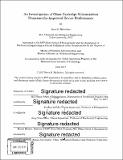An investigation of glass cartridge siliconization processes for improved device performance
Author(s)
McArthur, Scott D. (Scott Douglas)
DownloadFull printable version (14.96Mb)
Other Contributors
Leaders for Global Operations Program.
Advisor
Thomas Roemer and Jung-Hoon Chun.
Terms of use
Metadata
Show full item recordAbstract
This study aims to advance understanding of baked-in siliconization of cartridges for application in Insulin injection pens. This research is motivated by lack of knowledge of baked-in siliconization and business opportunities a better understanding can provide. The primary contribution from this work is the development of a recommended silicone profile that can significantly reduce friction force variation within a cartridge during device use. An Insulin pen delivers Insulin to patients by the mechanical pushing of a rubber stopper through a cylindrical glass cartridge forcing the Insulin through a hypodermic needle at the cap end. This cartridge is coated with a very thin layer of silicone to reduce the force necessary for injection. This silicone layer is introduced to the cartridge prior to filling in the manufacturing process. This step of the filling process was characterized and results revealed different silicone profiles and friction force profiles for different filling lines. Correlations between silicone profile and friction forces were then developed for cartridges. As predicated, lower levels of silicone thickness and a higher percent of dry spots led to increased friction forces and higher variation among samples. These correlations were used to recommend a silicone profile with an average layer thickness greater than 60nm with fewer than 20% dry spots. Finally, atmospheric pressure plasma (APP) treatment was explored as a pre-treatment step to improve siliconization. Findings from APP feasibility studies showed that APP increases glass surface energy and wettability, but that its effect wears off over time and therefore impact on siliconization is still unknown. These results set the stage for further research and process optimization of siliconization in the context of medical injection devices. Insights gained will contribute to design of new devices, improved manufacturing operations and increased quality for Sanofi and the pharmaceutical medical device industry. The opinions expressed herein are solely those of the author and do not necessarily reflect those of Sanofi.
Description
Thesis: M.B.A., Massachusetts Institute of Technology, Sloan School of Management, in conjunction with the Leaders for Global Operations Program at MIT, 2017. Thesis: S.M., Massachusetts Institute of Technology, Department of Mechanical Engineering, in conjunction with the Leaders for Global Operations Program at MIT, 2017. Cataloged from PDF version of thesis. Includes bibliographical references (pages 87-89).
Date issued
2017Department
Leaders for Global Operations Program at MIT; Massachusetts Institute of Technology. Department of Mechanical Engineering; Sloan School of ManagementPublisher
Massachusetts Institute of Technology
Keywords
Sloan School of Management., Mechanical Engineering., Leaders for Global Operations Program.